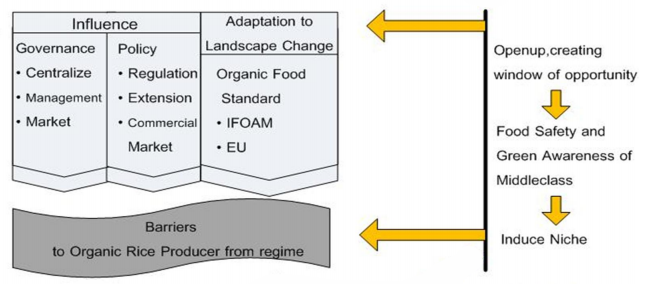The Struggle of Organic Rice in Thailand: A Multi – Level Perspective of Barriers and Opportunities for Up Scaling
Main Article Content
Abstract
Thailand has been experiencing agrochemical-based commercial rice production for several decades now. Until recently, organic rice production has survived, but with little expansion. The present study applies a Multi-Level Perspective (MLP) to analyze the composition of the related socio-technical system, from macro to micro levels, to cast a light on both the large picture and niche operations. This research used mixed methods comprising documents and interviews, while compiling secondary statistics to analyze the establishment and dominance of commercial or mainstream rice, as well as the emergence of organic rice as an experiment. When analyzing information at multiple levels, it was found that the agrochemical-based commercial rice regime has become a dominant socio-technical regime comprising; interwoven power of government policy, commercialized agro-businesses, markets, industry, technology and Thai cultural dimensions. Furthermore, government policy has been responding to the increasing landscape changes, it has simultaneously created barriers for organic rice production. The development of organic rice as a niche experiment was partly due to landscape changes but also due to NGOs, farmers and academic leaders, often as a reaction to the negative impacts of agrochemical-based commercial rice. This in-depth study has found that if intensive promotion is applied, organic rice could become quite successful in terms of production and marketing. Until now, its expansion has been very minimal due to government regulations and policies, along with fewer business supports. Therefore, there have been limitations in the up scaling of such experiments. Thus stronger attempts are needed to overcome resistance from the dominant regimes rather than focusing at the farm levels as has been the case.
Article Details
Published articles are under the copyright of the Environment and Natural Resources Journal effective when the article is accepted for publication thus granting Environment and Natural Resources Journal all rights for the work so that both parties may be protected from the consequences of unauthorized use. Partially or totally publication of an article elsewhere is possible only after the consent from the editors.

